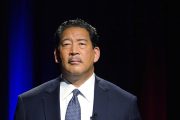
The New York Times story sets the scene of a shocking situation in the foothills of San Gabriel, California:
The building inspectors and police officers walked into the small row of connected town houses here knowing something was amiss. Neighbors had complained about noise and a lot of pregnant women coming and going. And when they went into a kitchen they saw a row of clear bassinets holding several infants, with a woman acting as a nurse hovering over them.
Women from around the world come here in the final days of their pregnancy to give birth to “American” babies. They come, these parturient pilgrims, from China, Turkey, South Korea, and from countries around the globe to take advantage of what they’ve been told is a provision in the U.S. Constitution that grants their opportunistic offspring the boon of automatic American citizenship.
The term used by officials to describe this group of misguided and misinformed expectant mothers is “maternity tourists.” One could inelegantly call the houses where they struggle through labor waiting for the impending birth of their children “anchor baby motels.”
An inspector quoted by the New York Times describes the conditions of these anchor baby motels:
These were not women living in squalor — it was a well taken care of place and clean, but there were a lot of women and babies. I have never seen anything like this before. We really couldn’t determine the exact number of people living there.
Covering the same story as it unfolded in its own backyard, the Los Angeles Times reports that:
Southern California has become a hub of so-called birthing tourism. Operators of such centers tend to try to blend in, attracting as little attention as possible.
But on quiet, residential Palm Avenue, neighbors had noticed an unusual number of pregnant women going in and out, and some complained about noise.
On March 8, code enforcement officials shut down three identical four-bedroom townhouses functioning as an unlicensed birthing center.
Upon interviewing the women occupying these makeshift maternity wards, city social workers discovered that they had paid grand sums for the chance to deliver their babies within the borders of the United States. According to the piece in the New York Times, companies in their home countries prey on these women, enticing them with offers to give birth to Americans.
Businesses in China, Mexico and South Korea advertise packages that arrange for doctors, insurance and postpartum care. And the Marmara, a Turkish-owned hotel on the Upper East Side in New York City, has advertised monthlong “baby stays” that come with a stroller.
The author of the New York Times article insightfully muses:
The discovery of the large-scale facility here in the San Gabriel foothills raises questions about whether it was a rare phenomenon or an indication that maternity tourism is entering a new, more institutionalized phase with more hospital-like facilities operating quietly around the country.
A more pertinent question, however, is why do these women fall for these bogus pitches and purchase travel packages promising “automatic citizenship” to the babies they deliver?
The question and the answer are to be found in the Fourteenth Amendment and the legislative history of the ratification thereof.
Recently, members of Congress have questioned the constitutionality of the grant of automatic citizenship to children born in the United States whose parents are illegal aliens. The subject of the inelegantly nicknamed “anchor babies” is seen as a crucial battle in the wider war against the invasion of the United States by millions of illegal aliens. ??The anchor in “anchor babies” refers to the purported ability of children born in the United States to foreign parents to sponsor those parents in their request for permanent residency here. According to the argument, as citizens of the United States, those children have the right to sponsor the immigration efforts of family members seeking legal immigration status.
While the stories in the New York Times and the L.A. Times report that not all of the pregnant tenants of these “anchor baby motels” were here illegally (in fact, during questioning by officials, most of the ladies insisted they possessed valid tourist visas and thus were legally present in the United States), the argument against the grant of automatic citizenship to their children born in this country is applicable.
First, the threshold issue concerns the appropriate locus of the accurate constitutional limits of the 14th Amendment and the legislative history of the enactment of the relevant clause. In large measure, the analysis should center on the existence of constitutional authority for the grant of citizenship to the hundreds of thousands of anchor babies born annually to the millions of foreign nationals — regardless of their immigration status.
The first prong of the inquiry is the meaning of the key phrase, “subject to the jurisdiction thereof” as used in the text of the 14th Amendment. The clause in its context reads, “All persons born or naturalized in the United States, and subject to the jurisdiction thereof, are citizens of the United States and the States wherein they reside.”
One of the authors of the citizenship clause was Michigan Senator Jacob Merritt Howard, a Republican representing Detroit. Howard was one of the charter members of the modern Republican Party. In fact, he helped formulate the platform of the GOP that was announced at its first convention held in Jackson, Michigan, in 1854. ??Senator Howard, who began his congressional career as a member of the Whig party, allied himself with President Lincoln’s coterie of supporters and played a vital leadership role on the Joint Committee on Reconstruction. As such, Howard crafted much of the language that was eventually ratified as part of the 14th Amendment.
During the debates that embroiled the Senate in those historic days following the Civil War, Senator Howard insisted that the qualifying phrase “subject to the jurisdiction thereof” be inserted into Section 1 of the 14th Amendment being considered by his colleagues. In the speech with which he proposed the alteration, Howard declared:
This amendment which I have offered is simply declaratory of what I regard as the law of the land already, that every person born within the limits of the United States, and subject to their jurisdiction, is by virtue of natural law and national law a citizen of the United States. This will not, of course, include persons born in the United States who are foreigners, aliens, [or] who belong to the families of ambassadors or foreign ministers accredited to the Government of the United States, but will include every other class of persons.
How could a person “born in the United States” be simultaneously a citizen and a “foreigner” or “alien” if the mere fact of nativity settled the question of citizenship???The Senator’s explanatory introduction crystallizes the intent of the man who wrote the citizenship clause. His statement suggests strongly that the legislators who supported the 14th Amendment never intended to swaddle all babies born within the geographic boundaries of the United States within the snug and secure blanket of citizenship. The doctrine of jus soli was not contemplated by the Congress and is inconsistent with the record of debates preceding the passage of the 14th Amendment’s citizenship clause.
We don’t need to take Senator Howard’s word alone, however. Howard’s understanding of the existing “law of the land” was reinforced by another influential lawmaker, Lyman Trumbull, the co-author of the 13th Amendment (the other of the two “Reconstruction Amendments”).??Trumbull, in commenting on the intended application of the restrictive “subject to the jurisdiction thereof” language appended to the citizenship clause, asked, “What do we mean by ‘complete jurisdiction thereof’? Not owing allegiance to anybody else. That is what it means.” That is about as direct a statement as one could hope for in such matters.
For good measure, Senator Howard seconded Trumbull’s opinion: “The word ‘jurisdiction’ as here employed, ought to be construed so as to imply a full and complete jurisdiction on the part of the United States…. That is to say, the same jurisdiction in fullest extent and quality as applies to every citizen of the United States now.”
Any reading of the plain language of the statute coupled with the pertinent legislative commentary reveals that a child born to persons present in the United States but with legal fealty to a foreign power cannot logically or legally benefit from the boon of citizenship when their parents are by very definition aliens to the “extent and quality” of that most desirable status.
Can the fountain of liberty send forth the sweet water of citizenship at the same place as the bitter water of unlawful or fraudulent entry?
Speaking to the New York Times, Angela Maria Kelley, the vice president for immigration policy and advocacy at the Center for American Progress, a “liberal-leaning” research organization, said:
If this is something that was really widespread and happening all over, you would have expected it to really have revealed itself. I think it deserves a lot more study and a lot more attention. But to say that you want to change the Constitution because of this feels like killing a fly with an Uzi.
Perhaps unwittingly, Ms. Kelley is correct in her evaluation of the constitutional implications of the “anchor baby” issue: We do not need to change the Constitution, we simply need to correctly interpret and consistently enforce the citizenship provisions that are already part of that document.


